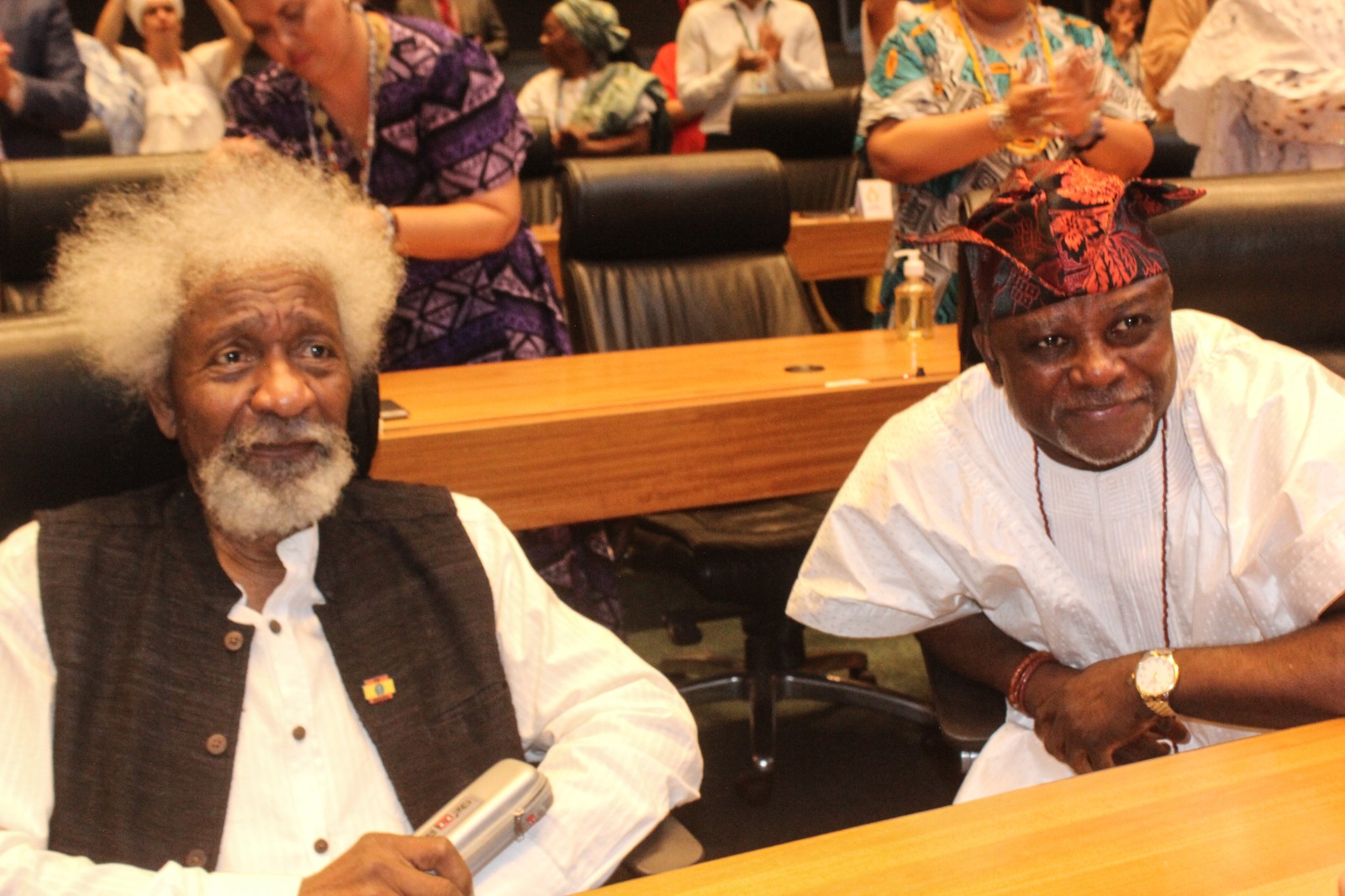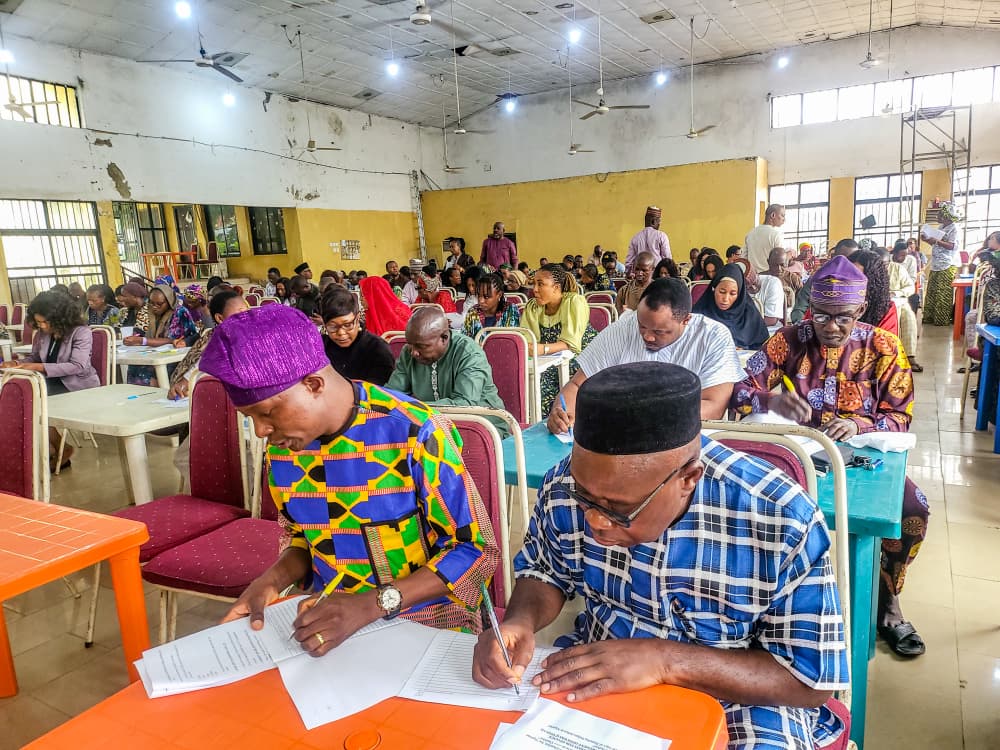Renowned Thespian and Executive Secretary of National Institute for Cultural Orientation (NICO), Associate Professor Barclays Foubiri Ayakoroma, has posited that, “in spite of the economic recession Nigeria is undergoing, live theatre practice can still thrive because it depends, to a large extent, on theatre artists”.
He made this assertion, while delivering a paper, entitled, “Contending with Live Theatre Practice in an Economy under Recession: Thoughts on Nigeria’s Contemporary Realities”, at the 2017 edition of the World Theatre Day (WTD), held on Monday, 27th March, 2017, at the Cyprian Ekwensi Cultural Centre, Area 10, Garki-Abuja.
Ayakoroma, in his introduction, noted that there was nothing new to say, as far as theatre practice in Nigeria was concerned, having written and presented two papers in 2012 and 2013 on similar topics, maintaining that those papers encapsulate the basic strategies needed to chart a new direction for theatre practice in Nigeria, under the present economic realities.
 Expatiating on the nature of the theatre, its essentials and its practice in Nigeria, he said, as an art form, theatre is “a place for teaching, as messages are communicated by the artists to the audience, just as it obtains in a Lecture Hall. It is also a war-front because actors face spectators, who may be in the dark and whose reactions may be sometimes unpredictable, ranging from the friendly to the antagonistic. This is in the sense that, as it is in a theatre of war, if a performance does not meet the expectation of an audience, anything can happen; and the director cannot come to their rescue at that point in time”.
Expatiating on the nature of the theatre, its essentials and its practice in Nigeria, he said, as an art form, theatre is “a place for teaching, as messages are communicated by the artists to the audience, just as it obtains in a Lecture Hall. It is also a war-front because actors face spectators, who may be in the dark and whose reactions may be sometimes unpredictable, ranging from the friendly to the antagonistic. This is in the sense that, as it is in a theatre of war, if a performance does not meet the expectation of an audience, anything can happen; and the director cannot come to their rescue at that point in time”.
He identified four elements of theatre, which he opined, were essentials for any event to qualify as theatre, adding that they are the four “Ws”, namely, what is performed, the performers (who), the venue (where), and the audience (for whom), saying, the practice of theatre “has become recognised in Nigeria, due credit, largely, to the positive developments in the Nigerian film industry, Nollywood”; and that some professional theatre troupes contributed immensely to the development of Nigerian theatre artists and the profession at large in the 1980s.
Some troupes he identified were PEC Repertory Theatre at JK Randle Hall, Onikan-Lagos, Chief Fred Agbeyegbe’s Ajo Productions, and University Travelling Theatres like Unibadan Performing Company (UPC), University of Calabar Performing Company (UCPC), Uniport Theatre (UPT), ABU Drama Troupe, and Ajon Players (founded by Prof. Olu Obafemi in Unilorin.
 According to him, there were also some amateur troupes in Lagos that contributed in no small measure to the development of theatre practice in Nigeria, including Lari Williams Playhouse; Komikals Playhouse (Ralph Akolade Aboyeji); Ayota Playhouse (Segun Taiwo); Agogo Playhouse at the Museum Kitchen, Onikan-Lagos; Okin Playhouse (Yemi Remi); Komitat Playhouse (Funsho Alabi); Isaac John Playhouse (Isaac John Inyang); and late Bassey Effiong’s Anansa Playhouse.
According to him, there were also some amateur troupes in Lagos that contributed in no small measure to the development of theatre practice in Nigeria, including Lari Williams Playhouse; Komikals Playhouse (Ralph Akolade Aboyeji); Ayota Playhouse (Segun Taiwo); Agogo Playhouse at the Museum Kitchen, Onikan-Lagos; Okin Playhouse (Yemi Remi); Komitat Playhouse (Funsho Alabi); Isaac John Playhouse (Isaac John Inyang); and late Bassey Effiong’s Anansa Playhouse.
Prof. Ayakoroma disclosed that he had the privilege of being the Assistant Director of Anansa Playhouse, and that it was one of the most vibrant theatre troupes in Lagos, having had the privilege of directing artists like Sam Loco-Efe, Richard Mofe-Damijo, Zulu Adigwe, Segun Taiwo, Segun and Yemi Remi, Roland Henshaw, Goddy Onowhosa and Charles Ukpong, among others; and groomed artists like Segun Arinze, Francis Onwochei, Jenkins Ekpo, and Ehi Omokhuale, among others.
Maintaining that the economic realities show that Nigeria is undergoing recession, Ayakoroma enumerated 10 indicators identified by analysts affirming that the country’s economy is in a comatose state, namely, massive job losses in banks and financial institutions; inability of State governments to pay workers’ salaries; Federal Government borrowing to fund annual budget; Nigerian companies recording massive losses; imminent increase in fuel price; foreign airlines (14 to be precise) exiting from the country’s aviation market due to unfavourable business climate; South Africa overtaking Nigeria as Africa’s biggest economy; the nation’s currency, naira, plummeting in the foreign exchange market; drastic cut or outright shut-down of oil production; and Nigerian officials going cap-in-hand to beg for investors abroad.
 Regarding the possibility of contending with Nigeria’s economic realities under the current economic recession, Ayakoroma, in the paper, made reference to his previous lecture, entitled, “Theatre Practice in Nigeria: To Be or Not To Be?” to suggest that theatre practice can be sustained in the country, if some of his deductions are taken seriously.
Regarding the possibility of contending with Nigeria’s economic realities under the current economic recession, Ayakoroma, in the paper, made reference to his previous lecture, entitled, “Theatre Practice in Nigeria: To Be or Not To Be?” to suggest that theatre practice can be sustained in the country, if some of his deductions are taken seriously.
Some of the deductions were that, theatre practice in Nigeria has not been really vibrant over the years; the theatre profession has not created good jobs for trained artists; trained theatre artists have not taken the profession seriously; unlike other professionals, theatre artists have not consciously tried to make a living out of the theatre profession; and educational theatre practitioners are also not cashing in on the availability of ready audiences on campuses to practice theatre
The astute theatre arts lecturer gave his thoughts, stating that, theatre can be sustained despite the economic recession Nigeria is undergoing at the moment, maintaining that, there is still hope for live theatre practice in Nigeria; that the onus th
en is on trained professionals to rise up to the task; that the theatre can leverage on the power of the television; that Silverbird Galleria has proved the point that cinema can be a profitable business venture after all; it is possible for theatre practitioners to factor into NollywoodThat just as stand-up comedians spice up their bills with popular music artists, it is possible for live theatre to draw from Nollywood stars; and that theatre practitioners can get sponsorship from the organised private sector depending on the quality and packaging of the productions.
The NICO boss concluded that the onus is on theatre professionals to look at the theatre profession as their means of survival, think that their lives depended on live theatre practice and so commit themselves towards energizing it through entertaining and edifying productions; that theatre as a slice of life is a reflection of the daily existence of the society in which the professionals live; since it has psychological immediacy, if its unique characteristics are tapped in order to impact on the lives of Nigerians, the professionals will move the theatre out of the current comatose state.
Prof. Ayakoroma advised that theatre professionals should emulate the stand-up comedians, who have packaged their events very well to meet audiences’ tastes to break even, and look up to broadcast media organs for partnership in order assure effective publicity and sustainability of their productions.
Njideka Dimgba
ES Office NICO
Abuja-FCT


